No to Monopoly Right!
• As Wisconsin Governor Signs Anti-Worker Bill, Workers and Youth Step Up Fight for Rights
• Summary of Governor Walker’s Anti-Worker Bill
Wisconsin Governor Signs Anti-Worker Bill
Workers and Youth Step Up Fight for Rights
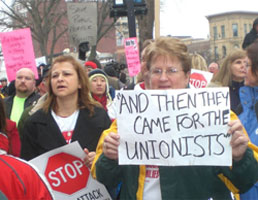 On March 11, as Wisconsin Governor Scott Walker signed into law the anti-worker, anti-social bill he pushed through the legislature, high school students organized walk-outs statewide. Workers and students have reclaimed the Capitol building in Wisconsin and continue to occupy it. Another major demonstration is taking place March 12, including a large delegation of farmers and others coming in from statewide and surrounding states.
On March 11, as Wisconsin Governor Scott Walker signed into law the anti-worker, anti-social bill he pushed through the legislature, high school students organized walk-outs statewide. Workers and students have reclaimed the Capitol building in Wisconsin and continue to occupy it. Another major demonstration is taking place March 12, including a large delegation of farmers and others coming in from statewide and surrounding states.
Walker signed the bill following passage in the Senate on Wednesday March 9, and then the Assembly on March 10. In all it took only three days for debate and votes in both houses in the amended bill, which removed any content on financial matters, despite being called a “budget” bill. As people have been saying from the start, this is bill is not meant to solve budget problems, especially those concerning education, healthcare and social programs. It is an anti-worker, anti-social bill that solves no problem and serves to make conditions worse.
The workers and students had prepared for possible passage of the bill March 9. Many packed the gallery inside while many more rallied outside. Workers statewide were again bussed in by the unions. When the Senate passed the bill, the crowds inside erupted with shouts of Shame, Shame! As soon as word reached protesters outside, thousands stormed the Capitol chanting Whose House? Our House! and This is What Democracy Looks Like! They immediately filled the building once again, jamming three floors. Firefighters remain a main force alongside teachers, students and healthcare workers.
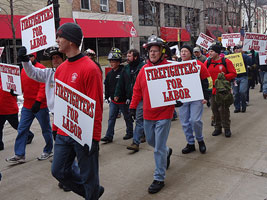 Within a short time, police abandoned efforts to keep people out, with some police themselves part of the demonstration. The occupation also occurred despite repeated efforts by the Governor and Republicans to block the public from entering their public building or bringing in signs, food, etc. After manipulating people to leave at night with the promise they could return in the morning, the Governor had acted to shut down the Capitol to the public. Special rules were passed, requiring people to have appointments, not use cameras, cell phones, or laptops etc. Police were stationed at all the doors and entrance for the public restricted to one door. But with passage of the bill, protesters refused to submit and insisted on entering. Once inside they also organized sit-ins in front of the offices of the Republican leaders of the Senate and Assembly and blocked the area outside the Assembly chanting We’re not leaving, Not this Time!
Within a short time, police abandoned efforts to keep people out, with some police themselves part of the demonstration. The occupation also occurred despite repeated efforts by the Governor and Republicans to block the public from entering their public building or bringing in signs, food, etc. After manipulating people to leave at night with the promise they could return in the morning, the Governor had acted to shut down the Capitol to the public. Special rules were passed, requiring people to have appointments, not use cameras, cell phones, or laptops etc. Police were stationed at all the doors and entrance for the public restricted to one door. But with passage of the bill, protesters refused to submit and insisted on entering. Once inside they also organized sit-ins in front of the offices of the Republican leaders of the Senate and Assembly and blocked the area outside the Assembly chanting We’re not leaving, Not this Time!
Thousands continue to remain inside the building and local police and the county sheriff are so far not forcing them out. As the county sheriff has said, “I refuse to be the palace guard for the Governor.” State troopers have acted to remove some of those conducting the sit-ins from in front of the Assembly, but not from the building itself.
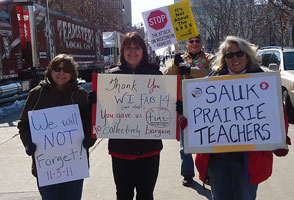 Chants of Whose House, Our House have also been joined by chants for General Strike! Local unions are going forward with plans for such a strike, both educating the public and preparing their ranks. The call, endorsed by the South Central Labor Federation encompassing 97 local unions and 47,000 workers is gaining increasing support. Head of the firefighters union Joe Conway in an interview March 10 explained: “Well, a strike is the trump card as Jim Cavanaugh from the south federation of labor said. We’ve got to work on it, put everything into place, make sure emergency operations are in place. It takes a lot of coordination. The general strikes that happened in Ontario, that’s similar to what happened here in Wisconsin. And so we’ve got to take those lessons learned back from the ‘70s in Ontario, 1935 in Minneapolis and San Francisco that created the National Labor Relations Act. We’ve got a lot of education and learning to do and if we do put this into place we’ve got to make sure it is effective and I think our people are ready.”
Chants of Whose House, Our House have also been joined by chants for General Strike! Local unions are going forward with plans for such a strike, both educating the public and preparing their ranks. The call, endorsed by the South Central Labor Federation encompassing 97 local unions and 47,000 workers is gaining increasing support. Head of the firefighters union Joe Conway in an interview March 10 explained: “Well, a strike is the trump card as Jim Cavanaugh from the south federation of labor said. We’ve got to work on it, put everything into place, make sure emergency operations are in place. It takes a lot of coordination. The general strikes that happened in Ontario, that’s similar to what happened here in Wisconsin. And so we’ve got to take those lessons learned back from the ‘70s in Ontario, 1935 in Minneapolis and San Francisco that created the National Labor Relations Act. We’ve got a lot of education and learning to do and if we do put this into place we’ve got to make sure it is effective and I think our people are ready.”
March 12 is sure to see yet another large demonstration standing up for the rights of the workers and the rights of all. Public service workers and their allies remain firm in saying that without the basic legal right to organize into collectives and bargain, the working class is stripped of its dignity and subjected to the whims, dictate, impunity and narrow interests of employers. Parts of Walker’s anti-worker bill are especially designed for this, giving the Governor arbitrary powers to declare “emergencies,” outlaw strikes and fire workers who organize or participate in them. This is a pre-emptive action in part to prevent strikes against passage of the bill.
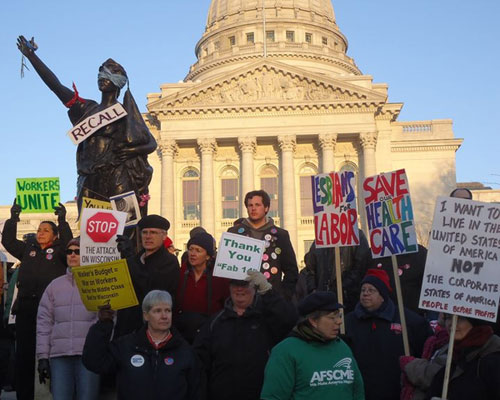
Public Right Yes, Monopoly Right No!
The bill also requires that unions recertify every year and that contracts only last for one year. This “legalizes” impunity for the governor and local executives to organize to eliminate the unions altogether while imposing tremendous uncertainty for the workers and the public they serve. The firm resistance by youth and workers in Wisconsin and nationwide shows they recognize the danger of these laws. A modern society cannot function without the working class having full legal right to organize itself and defend its basic interests and those of fellow workers and society.
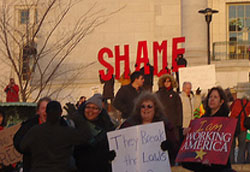 Youth and workers are also angered and concerned about the existing system of governance that allows big money and the monopoly media to put into power such an extremist anti-worker anti-social element as Walker and other Republican Senators. A recall campaign is underway to remove eight Republican Senators, with hundreds of thousands of signatures required and many tens of thousands already gathered. Plans to recall Walker after he has served the required one-year in office are also underway. But many recognize the limitations of such actions in serving to repeal the law, as even a Democratic majority in the Senate does not mean a repeal would pass the Assembly. So various other tactics, including strikes, demonstrations and boycotts are also under discussion.
Youth and workers are also angered and concerned about the existing system of governance that allows big money and the monopoly media to put into power such an extremist anti-worker anti-social element as Walker and other Republican Senators. A recall campaign is underway to remove eight Republican Senators, with hundreds of thousands of signatures required and many tens of thousands already gathered. Plans to recall Walker after he has served the required one-year in office are also underway. But many recognize the limitations of such actions in serving to repeal the law, as even a Democratic majority in the Senate does not mean a repeal would pass the Assembly. So various other tactics, including strikes, demonstrations and boycotts are also under discussion.
In addition, Wisconsin is not alone in facing these anti-worker bills. Across the country, states are demanding “flexibility” to eliminate or reduce pensions and healthcare and other workers’ rights. Republicans and Democrats alike are calling for massive budget cuts. There is grave concern that if the various laws removing binding agreements and legal guarantees for the rights of workers to organize to defend themselves and bargain collectively are instituted, the system will degenerate into an open fascist dictatorship of the most powerful rich and their monopolies.
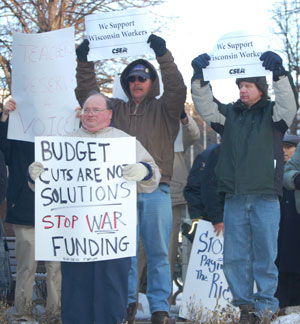 Many of the placards that protesters are carrying denounced the relationship between monopoly capital and those running in elections. Walker himself promotes the fact that the billionaire brothers Charles G. and David H. Koch and other wealthy people bankrolled his campaign for governor. Through millions of dollars of attack ads, his campaign and many like it created an atmosphere of fear and confusion over state budgets and the origin of the economic crisis. Racist anti-immigrant attacks were also widespread. Anti-immigrant laws at the state level, like the budget bills, are also being used to strip all workers of their rights and further benefit the monopolies.
Many of the placards that protesters are carrying denounced the relationship between monopoly capital and those running in elections. Walker himself promotes the fact that the billionaire brothers Charles G. and David H. Koch and other wealthy people bankrolled his campaign for governor. Through millions of dollars of attack ads, his campaign and many like it created an atmosphere of fear and confusion over state budgets and the origin of the economic crisis. Racist anti-immigrant attacks were also widespread. Anti-immigrant laws at the state level, like the budget bills, are also being used to strip all workers of their rights and further benefit the monopolies.
As protesters repeatedly proclaim, the stand of the people for rights must carry weight. It is public right that must flourish and monopoly right that must be restricted. This What Democracy Looks Like! The current system has no place in a modern society — where the people themselves, especially the working class and youth, are demanding empowerment and a system of governance that guarantees their right to participate in decision-making and to control the direction of the economy and how society funds itself and how it spends those funds. As signs across the country are saying in various ways: Stop Paying the Rich! Budget Cuts Are Not Solutions —Stop War Funding! Freeze Debt Payments to Banks, Not Workers’ Wages! Whose House? Our House! Whose Rights? Our Rights! Who Decides? We Decide!
[TOP]
Summary of Governor Walker’s Anti-Worker Bill
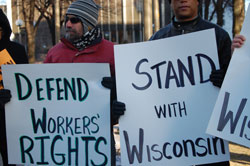 We provide below a summary of some of the main content in Wisconsin Governor Scott Walker’s Fiscal Year 2010-11 Budget Adjustment Bill. Although the Governor has insisted the bill was necessary to deal with a budget “deficit,” in order to get it passed it was amended to remove all references to financial matters. Commonly, significant bills include fiscal issues and require a quorum. Bills without financial issues do not. The maneuver, hailed by the Governor, allowed the Wisconsin Senate to pass the bill without a quorum of 20 Senators. None of the Democratic Senators were present for the vote, as they remained outside the state in an effort to block passage of the bill. Republican Senators voted 18-1 for passage.
We provide below a summary of some of the main content in Wisconsin Governor Scott Walker’s Fiscal Year 2010-11 Budget Adjustment Bill. Although the Governor has insisted the bill was necessary to deal with a budget “deficit,” in order to get it passed it was amended to remove all references to financial matters. Commonly, significant bills include fiscal issues and require a quorum. Bills without financial issues do not. The maneuver, hailed by the Governor, allowed the Wisconsin Senate to pass the bill without a quorum of 20 Senators. None of the Democratic Senators were present for the vote, as they remained outside the state in an effort to block passage of the bill. Republican Senators voted 18-1 for passage.
As well, to quickly bring the bill to the Senate floor, the conference committee responsible met quickly, without notice. Normally, 24-hour notice is required under Wisconsin’s open meeting laws. The committee reportedly met for five minutes, and the floor debate and vote took less than half an hour. These maneuvers in the Senate were preceded by similar maneuvers in the Assembly, when it passed the original bill in February. Then the vote was called in the early morning hours and the period open for voting was so short that most Democrats and even many Republicans did not get a chance to vote. Further, after the Senate passed its version of the bill, the Assembly also met quickly to pass the amended bill March 10. The entire period from voting on the changed bill to signing by the Governor was three days.
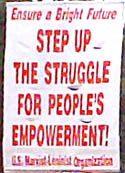 These sorts of maneuvers have outraged the people of Wisconsin and those nationwide as they further reveal the non-representative and undemocratic character of the current system of governance. The arrangements between Democrats and Republicans to settle conflicts are no longer working, while the firm demand of the majority against the anti-worker bill does not prevail. The people remain blocked from power in a situation where it is clear they represent the majority and can and must be decision-makers.
These sorts of maneuvers have outraged the people of Wisconsin and those nationwide as they further reveal the non-representative and undemocratic character of the current system of governance. The arrangements between Democrats and Republicans to settle conflicts are no longer working, while the firm demand of the majority against the anti-worker bill does not prevail. The people remain blocked from power in a situation where it is clear they represent the majority and can and must be decision-makers.
This anti-worker bill not only demands “flexibility” to eliminate agreements and future bargaining on pensions, healthcare and working conditions, it also demands that unions be recertified every year and that contracts only last for one year. Some collectives are simply removed as collectives legally permitted to bargain at all.
The anti-worker content of the bill is aimed not only at destroying unions and the ability of workers to organize, but also at gutting social services and creating conditions of even greater uncertainty for all. The bill, like many others nationwide, attacks not only the workers, but also the people making use of the public services and social programs the workers provide. It is a means to undermine the living standards of the workers and decimate the services while ensuring public funds are used to pay the rich — through handing over pensions as well as guaranteed debt payments, tax breaks, incentive programs, and war funding. It is a bill openly guaranteeing monopoly right at a time with the people are demanding that public right be guaranteed.
State, Local Government & School District Labor Relations
Collective bargaining: The bill would remove working conditions, pensions and benefits as areas for contract negotiations. In addition, while wages can be negotiated, total wage increases could not exceed a cap based on the consumer price index (CPI) unless approved by general referendum.
Contracts would be limited to one year and wages would be frozen until the new contract is settled. In addition, unions would be forced to recertify every year. Workers already have broad experience with such recertification votes, which provide employers an opportunity to blackmail, harass, and threaten workers defending the unions.
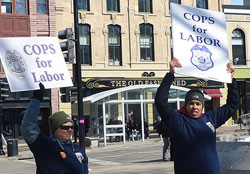 As well, employers would be prohibited from making the usual paycheck deductions for collecting union dues and workers who are members of collective bargaining units would not be required to pay dues. These are typical “right to work” clauses, already in use in 22 states nationwide.
As well, employers would be prohibited from making the usual paycheck deductions for collecting union dues and workers who are members of collective bargaining units would not be required to pay dues. These are typical “right to work” clauses, already in use in 22 states nationwide.
All of these features are aimed at undermining the ability of the unions to organize, to create conflict among the workers and conditions of constant uncertainty for all. It gives state executives arbitrary powers to remove and change pensions and benefits, while greatly limiting the organizing rights of the workers.
Local law enforcement, firefighters, and state troopers and inspectors would be exempt from these changes.
Elimination of Contracts for Certain Workers: The bill repeals the authority of home health care workers under the Medicaid program to collectively bargain. It also repeals the authority of family childcare workers, University of Wisconsin Hospitals and Clinics (UWHC) Board and Authority workers and University of Wisconsin faculty and academic staff to collectively bargain. This means no contracts for these workers, and standards for working conditions, wages and benefits arbitrarily set by government officials.
Preventing work actions: If the Governor declares a state of emergency, an action arbitrarily and unilaterally determined by the Governor, the bill authorizes appointing authorities to fire any worker that participates in an organized action to stop or slow work and any worker that is absent for three days without approval.
Part-time workers: Part-time workers, known as Limited Term Employees (LTE’s), would not be eligible for health insurance or participation in the Wisconsin Retirement System and the pensions it provides.
Pensions, Benefits and Wages
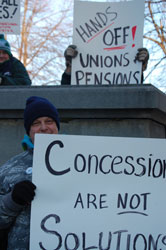 Currently, state employees on average pay approximately 6 percent of annual health insurance premiums. This bill will require that state employees pay at least 12.6 percent of the average cost of annual premiums. In addition, the bill would require changes to the plan design necessary to reduce current premiums by 5 percent. Local employers participating in the Public Employers Group Health insurance would be prohibited from paying more than 88 percent of the lowest cost plan. These measures generally mean worse care and fewer covered benefits. The bill would also authorize the Department of Employee Trust Funds to use $28 million of funds in reserve accounts and hand them over to the insurance and pharmaceutical monopolies.
Currently, state employees on average pay approximately 6 percent of annual health insurance premiums. This bill will require that state employees pay at least 12.6 percent of the average cost of annual premiums. In addition, the bill would require changes to the plan design necessary to reduce current premiums by 5 percent. Local employers participating in the Public Employers Group Health insurance would be prohibited from paying more than 88 percent of the lowest cost plan. These measures generally mean worse care and fewer covered benefits. The bill would also authorize the Department of Employee Trust Funds to use $28 million of funds in reserve accounts and hand them over to the insurance and pharmaceutical monopolies.
The bill directs the Department of Employee Trust Funds and the Group Insurance Board to implement health risk assessments and similar programs aimed at participant wellness, collect certain data related to assessing health care provider quality and effectiveness, and verify the status of dependents participating in the state health insurance program. This too is a measure to further limit benefits, especially for families.
The bill directs the Department of Administration, Office of State Employment Relations and Department of Employee Trust Funds to study and report on possible changes to the Wisconsin Retirement System, including defined contribution plans and longer vesting periods. The three agencies must also study and report on changes to the current state health insurance plans, including health insurance purchasing exchanges, larger purchasing pools, and high-deductible insurance options. The studies are considered a prelude to the elimination of defined benefit pensions, representing a major attack on pensions.
Sale of State Heating Plants
The bill authorizes the Department of Administration to sell state heating plants. These are public assets and contribute to the energy needs of the state. According to reports, these sales can be done on a no-bid basis, meaning the executive branch can hand these public assets over to the monopoly of its choosing. The proceeds from any sale must first be used to pay debt servicing. Anything that remains would be deposited in the “budget stabilization” fund. This allows any fund s secured to be used however the Governor sees fit to “stabilize” the budget.
[TOP]
